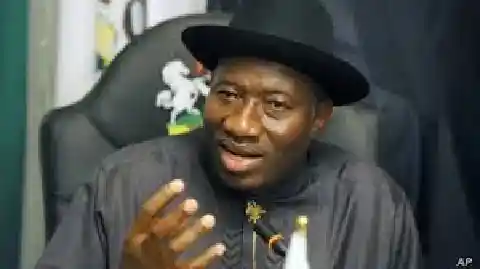Suspension of Fubara, lawmakers dents Nigeria’s image — Jonathan.
In a bold and unprecedented statement, former President Goodluck Jonathan has condemned the suspension of Rivers State Governor Siminalayi Fubara and other elected officials.
Speaking at the Haske Satumari Foundation Colloquium in Abuja, Jonathan cautioned that such drastic measures not only disrupt the delicate balance of Nigeria’s governance but also tarnish the country’s international image.
His comments come in the wake of President Bola Tinubu’s declaration of a state of emergency in Rivers State—a decision aimed at quelling mounting political tensions between the state’s governor and lawmakers.
The Context of the Suspension
On a turbulent week in Nigerian politics, President Tinubu announced a state of emergency in Rivers State. In a move designed to restore stability, the president suspended Governor Siminalayi Fubara, his deputy Ngozi Odu, and all members of the state House of Assembly for a period of six months.
This decision was further reinforced on Tuesday when Tinubu appointed retired Chief of Naval Staff, Vice Admiral Ibok-Ete Ekwe Ibas, as the state’s sole administrator.
The Senate and the House of Representatives later approved the emergency rule, signaling widespread legislative support for the measure.
However, the suspension of these key state figures has raised serious concerns regarding the long-term impact on Nigeria’s democratic institutions.
Former President Jonathan’s remarks underscore the potential risks associated with such interventions. By targeting elected officials, the government risks alienating the electorate and undermining the fundamental principles of accountability and checks and balances that are critical to any vibrant democracy.
Jonathan’s Call for Prudence and Accountability
Jonathan’s intervention in the political debate was particularly striking given his historical reluctance to engage in contemporary political controversies. Traditionally, former presidents in Nigeria and around the world refrain from commenting on current government actions to avoid inflaming tensions. Yet, responding to widespread calls from Nigerians—especially those from the Niger Delta—Jonathan broke with convention to voice his concerns.
He asserted that the suspension and the broader intervention in the state’s political processes reflect deeper systemic issues. “These actions by key actors in the executive and legislative arms of government paint the country in a negative light,” Jonathan stated. His criticism extended beyond the immediate political crisis to address long-standing issues of judicial independence and government accountability.
Jonathan elaborated that interference in the judiciary and other state institutions not only erodes public trust but also jeopardizes Nigeria’s economic prospects. He warned that a compromised judiciary could deter foreign investment, as investors are unlikely to commit resources in an environment where government functionaries may exert undue influence over legal outcomes.
“No businessman can bring his money to invest in a country where the judiciary is compromised,” Jonathan emphasized, highlighting the potential economic fallout of such governance practices.
Broader Implications for National Governance
The suspension of elected officials in Rivers State raises a host of questions about the balance of power within Nigeria’s federal system. The decision, although presented as a means to restore order, has stirred debate over the appropriate limits of executive intervention in state affairs. Critics argue that while the intent may be to restore stability, the long-term implications could be damaging if such measures become a norm rather than an exception.
Jonathan’s remarks delve into this broader debate. He argued that while decisive action is sometimes necessary in the face of political unrest, any measure that undermines institutional independence can have far-reaching consequences. According to him, the unchecked power of any arm of government—be it the executive, legislative, or judiciary—can create an environment ripe for abuse and corruption.
Drawing parallels with international examples, Jonathan noted that in many established democracies, former leaders tend to exercise restraint when commenting on the actions of current administrations. This approach is intended to preserve political stability and avoid deepening societal divisions. Yet, in Nigeria, where democratic institutions are still evolving, such interventions can be seen as both a symptom and a cause of deeper governance challenges.
Economic and Social Consequences
The economic ramifications of suspending key state officials extend beyond the political arena. Jonathan’s critique touches on a fundamental issue: investor confidence. Nigeria, with its vast natural resources and large market, has long been viewed as a land of opportunity for both domestic and foreign investors. However, sustained political instability and interference in institutional processes can quickly erode this perception.
A compromised judiciary, for instance, is not merely a legal issue—it is an economic one. Investors rely on a fair and impartial legal system to protect their assets and resolve disputes. When political interference clouds the judicial process, the risk profile of doing business in Nigeria increases significantly. Jonathan’s warning that “no businessman can bring his money to invest in a country where the judiciary is compromised” resonates with many in the international business community who seek transparency and accountability in their host countries.
Furthermore, Jonathan touched on how these internal dynamics affect Nigeria’s global standing. A country that is seen as politically unstable or rife with internal conflict is less likely to receive favorable treatment on the international stage. Issues such as the valuation of Nigerian passports and the treatment of Nigerian citizens at international airports, he noted, are symptomatic of a broader loss of confidence in the nation’s institutions. These issues, while seemingly minor on the surface, have significant long-term implications for national pride and international relations.
The Role of Civil Society and Shared Responsibility
Amid the criticism of governmental actions, Jonathan also emphasized the importance of collective action in driving social change. He underscored that building a nation where future generations can thrive requires the active participation of all stakeholders—government officials, civil society, the private sector, and the citizenry. “Social change is not a one-time event, but a continuous process,” he remarked. This statement is a call to action for Nigerians to hold their leaders accountable and to strive for transparency and good governance.
In his address, Jonathan reflected on the necessity of maintaining checks and balances within the government. By criticizing the suspension of key officials, he highlighted the importance of ensuring that no single arm of government becomes too powerful. Such balance is crucial for safeguarding the rights and freedoms of citizens and for maintaining a robust democracy.
Looking Forward: Rebuilding Trust and Restoring Confidence
The current political crisis in Rivers State serves as a cautionary tale about the potential dangers of overreach by the executive branch. Jonathan’s intervention, while controversial, has sparked a broader conversation about the need to rebuild trust in Nigeria’s institutions. His call for accountability and his insistence on the importance of doing what is right—even when it is politically inconvenient—resonate with many Nigerians who are eager for substantive change.
Rebuilding trust will require more than just temporary measures. It will demand a sustained commitment to reform, an unwavering dedication to the rule of law, and a willingness to engage in open, honest dialogue about the challenges facing the nation. As Jonathan pointed out, the future of Nigeria depends on the collective efforts of all stakeholders to create an environment where justice, accountability, and good governance are not just ideals but lived realities.
The Imperative for Transparent Governance
Transparency and accountability remain at the heart of Jonathan’s critique. His comments serve as a stark reminder that any action taken by government authorities must be scrutinized to ensure that it serves the broader interests of the nation rather than the interests of a few.
In an era where information flows freely and public opinion is more informed than ever, the legitimacy of government actions hinges on their perceived fairness and their alignment with the principles of democracy.
Jonathan’s reference to the “Indian proverb” about waking someone who is pretending to sleep illustrates the difficulty of addressing entrenched power dynamics. It suggests that change is hard to achieve when those in power are unwilling to acknowledge their responsibilities. Yet, his insistence that every citizen, regardless of their position, must contribute to the fight for a better nation offers a hopeful vision of collective empowerment.







